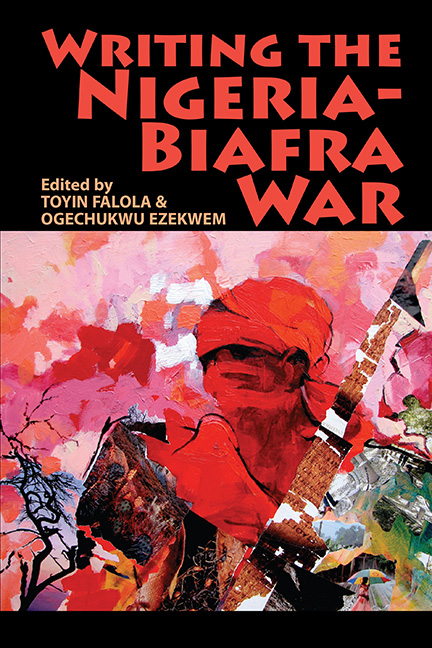Book contents
- Frontmatter
- Contents
- Notes on Contributors
- List of Abbreviations
- Timeline
- Map of Biafra 30 May 1967 – 1 May 1969
- 1 Scholarly Trends, Issues, and Themes: Introduction
- Part I On The History Of The Nigeria-Biafra War
- Part II Critical Debates On The Nigerian Crisis
- Part III The War In Fiction, Memoir, And Imagination
- Part IV Locating Gender In Nigeria-Biafra War Literature
- Select Bibliography
- Index
10 - Memoirs and the Question of Objectivity: Revisiting Alexander Madiebo’s The Nigerian Revolution and the Biafran War and Robert Collis’s Nigeria in Conflict
Published online by Cambridge University Press: 17 June 2021
- Frontmatter
- Contents
- Notes on Contributors
- List of Abbreviations
- Timeline
- Map of Biafra 30 May 1967 – 1 May 1969
- 1 Scholarly Trends, Issues, and Themes: Introduction
- Part I On The History Of The Nigeria-Biafra War
- Part II Critical Debates On The Nigerian Crisis
- Part III The War In Fiction, Memoir, And Imagination
- Part IV Locating Gender In Nigeria-Biafra War Literature
- Select Bibliography
- Index
Summary
Introduction
Two concepts – memoirs and objectivity – provide the major thrust for this discourse and as such delimit the boundaries of our probe of the two authors whose works are under examination. However, these two words are meaningful only if discussed in the context of historical writing about the Nigeria-Biafra War. It is imperative that our convenient takeoff point should be to know what history is and what it takes to write a work that could actually be regarded as an intellectual historical piece, as this line of action would establish which of the two works is more objective. An important question for us here would be to ask if we are talking of history as a body of knowledge existing on its own, or as a discipline. In the case of the latter, we are concerned with the reconstruction of the past by the use of existing knowledge about that aspect of the past that caught our interest. This demarcation is necessary because, as Colin Wells would always caution, ‘history, the discipline, goes beyond the simple past’ and that it goes beyond ‘official recordkeeping and even palace chronicles’. Wells argues:
As an intellectual discipline, a particular way of thinking about the past (not better or worse, but peculiar to itself), the tradition of history that began with Herodotus has an essential ingredient that separates it from other traditional approaches to the past. History's defining characteristic is not record-keeping or list-making, though it shares its interest in the past with these pursuits (not to mention using them as source materials). What distinguishes history's attitude to the past is the overarching goal of rational explanation. History is about explaining the past, not just recording it.
The above observation by Wells creates a distinction between history as a discipline and history as the ordinary past. A probe into history as the ordinary past and its meaning and relevance as a body of knowledge yields the summation below. History is the memory of human group experience. If it is forgotten or ignored, we cease in that measure to be human. Without history, we have no knowledge of who we are or how we came to be, like victims of collective amnesia groping in the dark for our identity.
- Type
- Chapter
- Information
- Writing the Nigeria-Biafra War , pp. 209 - 229Publisher: Boydell & BrewerPrint publication year: 2016



